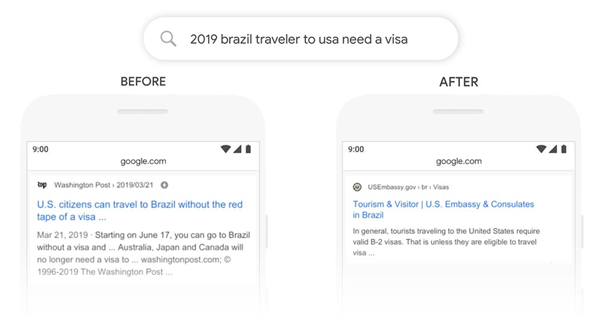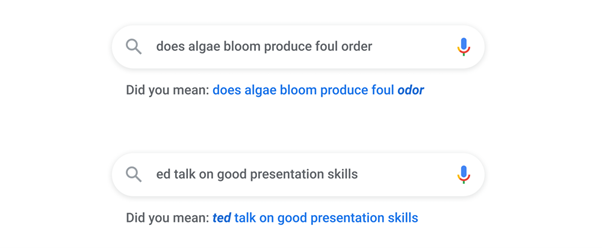In recent years, Google’s research team has made significant improvement in the science of language understanding to help the search engine better understand online content and correlate with user search intent. Here are some latest advancements in its machine learning.
BERT models
Last year, Google introduced BERT, a neural network-based technique for natural language pre-training. BERT is used to help better understand how users communicate so that search engine can return more relevant results for users.
BERT framework can handle words in connection to all the other words in a sentence, instead of one by one. BERT models will consider the complete context of a word by looking at the words that come before and after it—particularly valuable for understanding the search intent behind. It is especially useful for longer, conversational queries, or searches where prepositions like “for” and “to” matter a lot to the meaning.
For example, below is a search for “2019 brazil traveler to usa need a visa.” The word “to” and its relationship to the other words in the query are crucial to understanding the meaning behind – It’s about a Brazilian traveling to the U.S., but not the other way around.
Previously, Google’s algorithms wouldn’t consider the importance of “to” and the implied meaning. So, we got results about U.S. citizens traveling to Brazil. Now with BERT, Google search engine is able to grasp the context and learn that the common word “to” actually contributes to an important meaning in the query, so that it can show more relevant search results.

Recently at Google’s virtual Search On 2020 event on Oct 15th 2020, Google announced that BERT powers almost every single English based query done on Google search – a dramatic increase from 1 in every 10 queries last year when it is first introduced.
AI-powered advancement to fix misspellings in queries
According to Google, one in 10 queries every day are misspelled. On Oct 15th, Google has announced a new breakthrough for spelling algorithm that adopts a deep neural net to significantly improve its ability to work out misspellings. By better understanding the context of the misspelled words, Google can help provide the right search results.

Example of Google detecting the misspellings of “odor” and “ted” with its auto suggestions
AI-powered advancement to understand specific passages on webpages
Google is now able to cater for specific searches. Previously, Google search engine only crawled and indexed on webpage level. Now by better understanding the relevancy of specific passages on a webpage, Google can rank more relevant search results for specific queries and search intent.

Example of how Google is now able to show specific results based on better understanding of webpage passage content
Coming soon – AI-powered advancement to analyze subtopics
Google recently announced that they will be rolling out a search advancement which applies neural nets to understand subtopics around an interest. This helps to offer a greater diversity of search results when your search is broader and more generic. For example, if you search for a generic term “home exercise equipment,” Google can now relate your query to relevant subtopics, such as budget equipment, premium picks, or small space ideas, and offer a wide variety of content in search results for you.

3 Key Takeaways for Your Website SEO
1. We are way past keyword density
Now with the above AI-powered language understanding advancements, it could mean a step away from the previous keyword density “x number of keyword mentions on a page” approach. You need to truly understand audience interests and preferences so that you can provide quality content that aligns with user search intent.
2. Search Engine is not just reading meta content
Your website content is becoming more and more important. With Google’s capability to understand specific contexts and word connections in passages, webpage content that includes relevant synonyms and long-tail keywords will become valuable for SEO. So, avoid only focus on writing attractive headers. Instead, you must spend time to produce fruitful website page content with in-depth information.
3. Clear contexts and writing angles are now more important than ever
Now that Google search engine can provide more specific results for long tail keyword searches, you have a higher chance to hit the right audience if your website can provide specific information. It is key to analyze your organic search data to understand users’ search intent – what kind of information they are looking for. Make sure to plan your content direction so it aligns with your target audience.
If you need to cater for various audience segments, you can develop multiple content to cover different angles and specific information. For example, for a coffee shop’s website, to capture queries asking for “instagrammable coffee shops”, you can include specific content section to introduce instagrammable corners and special photo spots at the café.
Do revisit your existing content to see where you can refine your angles to make your content more delicious for both Google and users!
Have questions about your website SEO? Talk to our team today!
Source: Google




